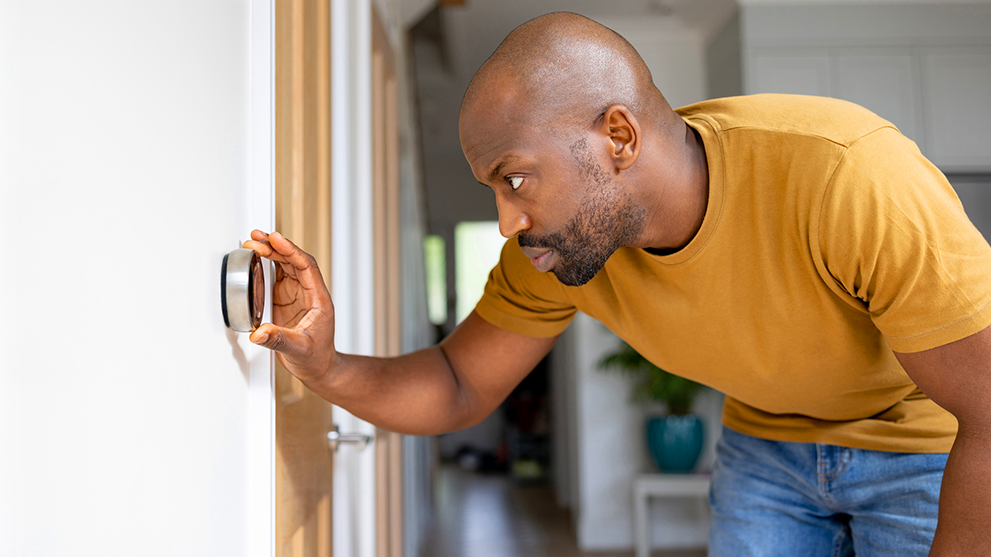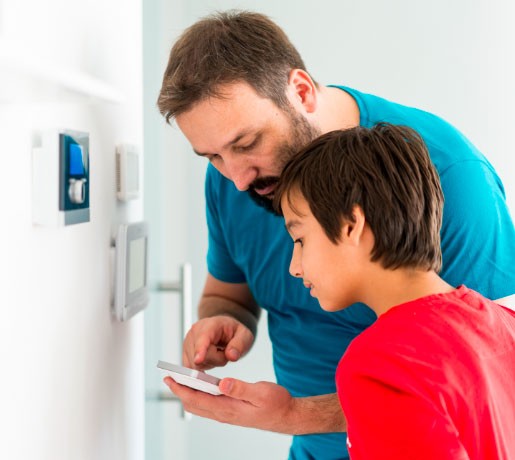Reduce your bill with these simple tips.
Check out these low to no-cost tips that both renters and homeowners can follow to save on their energy bill throughout the year. By following these tips, you can decrease your energy usage and make your home more energy efficient.
- Warm Weather Tips
- Cold Weather Tips
- Homeowners Tips
- Renters Tips

Reduce the temperature inside your home by using an outdoor grill or smoker instead of indoor ovens and stoves.

Have your A/C professionally serviced now to ensure it's running efficiently. Trim nearby plants around the A/C units so they can receive proper air flow.

Cleaning windows or dusting blinds? Close draperies, blinds, or shades to reduce extra heat caused by direct sunlight. Consider opening windows, and turning off your A/C, when cooler weather allows.

Pool pumps can use a significant amount of energy when running constantly. Operate pool pumps the minimum number of hours needed to keep the pool clean and invest in a timer to control hours of operation. Also, consider using a pool cover for additional energy savings.

Nearly 20 percent of your monthly energy use may be attributed to cooling your home in the summer. Inefficient heating, ventilation and air conditioning (HVAC) systems can also amount to hundreds of dollars in additional energy costs every year.

Proper cleaning and maintenance of the refrigerator, such as dusting the dirt from refrigerator coils and removing food to allow air to circulate, can reduce its energy consumption.

Set your programmable thermostat to 78°F in the summer for energy-efficient results. Also utilizing your ceiling fan can make your space feel 5°F cooler, keeping you comfortable and relaxed.

To maintain consistent temperatures throughout your home, keep air vents and registers clear of obstructions such as furniture, curtains and rugs.

A ceiling fan will allow you to raise the thermostat setting by as much as 4 degrees Fahrenheit with no reduction in comfort. During moderately hot weather, ceiling fans may allow you to avoid using your air conditioner altogether.

Prevent overloading equipment and circuits. It can cause insulation to burn, create sparks and leave exposed wires.

These units will trip the breaker if the power strip is overloaded and shorted to prevent overheating.

Keep heat where it belongs with proper insulation in attics and walls. You'll save energy 24/7 and be eligible for hundreds of dollars in rebates from Georgia Power.

Close the flue damper tightly, or leave cracked if it's a standing pilot light when the fireplace is not in use. Consider increasing fireplace efficiency with a heat-circulating fireplace and chimney adapter system.

Check for outlets that have loose-fitting plugs, exposed wires or broken plates. Have them fixed by a qualified electrician.

Keeping the blinds and shades open during the day is a no-cost way to naturally heat your home. Close them at night to reduce the chill you may feel from cold windows.

Heating accounts for as much as 50 percent of a home's typical winter energy usage. Maximize the efficiency of the unit by changing the filters once a month, or every three months for pleated filters. Ensure that heating vents are clear of any obstructions, such as furniture or drapes.

Developing a schedule to conduct home checks of appliances and outlets is a simple way to catch potential fire hazards.

Know where the nearest fire extinguishers are and how to use them. Only Class C extinguishers are safe to use on energized electrical equipment.

Replace cracked or peeling caulk or weather stripping around doors and windows to save up to 10 percent on energy use.

Do not place appliance cords where they will come in contact with the stove or other heated surfaces. Do not hang appliance cords over countertops, where they might be accidentally pulled down. Worn or frayed appliance cords can cause fires, electric shock and even electrocution. Inspect cords regularly to assess wear and replace cords as needed.

Prevent oil and dirt buildup on electrical appliances which can cause electrical equipment to overheat and short-circuit.

Keep space heaters away from furniture, curtains, sinks, tubs and water. Do not lay rugs or carpet over the cord. Do not use heaters if the cord is frayed or broken, and do not use an extension cord. Turn off heaters before leaving home or going to bed.

Set your thermostat to 68 degrees or lower and maintain a consistent temperature in the house. Each additional degree has a substantial impact on energy costs. Install a programmable thermostat that automatically adjusts the home's temperature settings when you are away from the house, and save up to $100 a year in energy costs, plus Georgia Power rebates up to $75.

Make sure to use safety covers on all outlets accessible to children.
Georgia Power offers a state-of-art product, SurgeDefender, to single-family homeowners including individually metered, owned townhouses and condominiums to help protect motor-driven appliances such as refrigerator, HVAC, washer/dryer from power surges entering on the electric lines.
When looking for ways to enjoy year-round comfort and home energy savings, the Home Energy Improvement Program (HEIP) offers Georgia Power customers rebates for implementing and installing Whole House or Individual Improvements. For more information, call 1-877-310-5607 or visit the HEIP site.
Switching your temperature setting from hot to warm or setting to the recommended 120 degrees F can cut energy use in half. Using the cold cycle reduces energy use even more.
Your home’s thermal boundary—also called its “envelope” or “shell”—consists of its outer walls, ceiling, windows, doors and floors. Sealing your home’s envelope reduces drafts and helps prevent moisture problems. It can save you up to 10 percent* on your energy bill and keep you more comfortable during the hottest and coldest months of the year. Air sealing a home with gas appliances can cause safety issues and should be done by a professional.
* Source: ENERGY STAR®
Turning off just one 60-watt incandescent bulb before you leave the house for the day can save about $15* per year in energy costs. Always turn off the lights when leaving a room, too. It’s the easiest way to save energy and money. If it’s practical, invest in occupancy sensors, which automatically turn lights on and off for you.
*Source: ENERGY STAR®
Unless they have independently operating compartments, most automatic dishwashers require the same amount of hot water and electricity to wash a partial or full load.
Sealing rim joist air leaks can make a big improvement in your home’s energy use—especially in the winter. Use caulk or expanding spray foam to seal areas between the sill plate and foundation, in cavities between rim joists and all electrical penetrations, and around pipes and ventilation ducts that pass outside of the house.
To maintain even temperatures throughout your home, keep air vents and registers clear of obstructions such as furniture, curtains and rugs.
Easy money. You can save up to $50 or more per computer by activating system standby or hibernate features.
* Source: ENERGY STAR®
There’s no need to heat or cool the outdoors. Save money and energy by keeping conditioned air inside where it belongs.
Visit EnergySaver.gov for guides and videos that show you how to complete DIY projects, including caulking, weather stripping, installing storm windows, and improving your water heater efficiency. See the Weatherization section for more steps to get started.
Turn off kitchen, bathroom and other ventilating fans as soon as they are no longer needed. In about one hour, these fans can pull out a substantial amount of warmed or cooled air.
Save energy and money with ENERGY STAR® qualified lighting fixtures, which are available in variety of popular styles, including cabinet-mounted, ceiling-mounted, recessed can models and more. To learn more, visit www.georgiapower.com/lighting.
Let your dishwasher do the work and save up to 3 times the water.
Use your microwave or toaster oven to reheat or cook small portions. This can help you save on summer air conditioning costs, since they generate significantly less heat than your stove and oven. It also reduces cooking energy by as much as 80 percent*.
* Source: ENERGY STAR®
Sealing and insulating ducts can improve the efficiency of your heating and cooling system by as much as 20 percent* - and sometimes much more.
*Source: ENERGY STAR
Lower your thermostat when large groups of people are expected during the winter. Because our bodies act as small heaters and humidifiers, a gathering will compensate for the lower setting.
If you’re shopping for a newly constructed home, ask the builder about the home’s HERS score (Home Energy Rating System), which measures the energy efficiency of a home. The lower the HERS score, the greater the efficiency and energy savings.
In addition to accepting payments online and by mail, pay your bill where you shop. We offer over 4,000 Authorized Payment Locations (APLs) sites. Learn more about APLs by visiting georgiapowercheckout.com.
If your heating and cooling system is older, consider installing a more efficient system with a higher SEER (Seasonal Energy Efficiency Ratio). The most energy-efficient way to heat and cool your home year-round, today’s heat pumps are easy to install and maintain.
Avoid using appliances that give off heat during the hottest times of the day as they will make your cooling system work that much harder. Cook your meals, wash your dishes and launder your clothes in the morning or in the late evening, when the demand on your cooling system is less.
Proper attic ventilation can reduce your energy consumption and increase your comfort during summer’s heat and winter’s chill. Natural air flow in the attic also keeps the roof decking cool and dry, extending the life of roof shingles. Be sure attic soffit, gable and ridge vents are not blocked so air flows freely through them.
The average U.S. household has about 70 lightbulbs. Change standard light bulbs in your home to ENERGY STAR® qualified LED bulbs. LEDs use 90 percent* less energy than standard bulbs, saving you more than $80 in electricity costs over its lifetime, and can last up to 15 times longer.
* Source: ENERGY STAR®
Take advantage of peak-use pricing and operate your home appliances—like your washer, dryer and dishwasher – during off-peak times. Off-peak electricity rates apply during times when power demand is lower resulting in reduced rates. This will also help reduce the load on your home’s electrical system.
A storm door creates a pocket of insulated air space between itself and your house’s exterior door. This reduces heat transfer into and out of your home, lowering heating and cooling costs.
Install a programmable thermostat to automatically adjust your home’s temperature settings when you’re away or sleeping, and save up to $100* a year. Visit georgiapowermarketplace.com to see available thermostats and rebates.
*Source: ENERGY STAR
Consumer electronics account for 15 percent of household electricity use. Many electronics products use energy even when turned off. Choose ENERGY STAR electronics to help save energy when off.
* Source: ENERGY STAR®
Insulation is designed to resist heat flow, which reduces the amount of heat transferred inside your house during hot weather, and helps reduce heat losses when it’s cold outside. We recommend R-30 for the attic, R-19 for floors and R-13 for walls or local codes, whichever is higher. (Most homes built prior to 1978 were not required to have wall insulation.)
Electric blankets save you money during the winter because they enable you to lower your thermostat setting. And, each degree you set your thermostat back saves you about 3-4% on heating costs. If you have an electric blanket, remember to use it wisely: Turn it off during the day and place another blanket on top of it to keep in the heat. Always follow the manufacturer’s instructions about covering it and securing the corners to your mattress.
Change your filters once a month during the heating and cooling season. If you have pleated filters, change them at least every three months. If you’ve replaced your air filters but your system still seems to be performing poorly, have it serviced by a licensed contractor.
By recycling your secondary refrigerator or freezer, you'll save up to $100 a year in energy costs, or as much as $800 over its remaining life. Learn more about the Refrigerator Recycling Program.
Thermal or storm windows can save you energy by reducing heat loss in the winter and heat gain in the summer. They also increase comfort by helping eliminate drafts, reduce fading of interior furnishings and decrease outside noise that enters your home.
When buying or replacing equipment for your home, be sure to compare the energy requirements of various models. Whenever possible, invest in high efficiency products that have earned The ENERGY STAR® label. For more details, visit energystar.gov.
Seal around wiring and plumbing penetrations. Use caulk for small holes and expanding foam for larger areas. This will keep unconditioned air from entering the house or conditioned air from escaping.
Learn how using heat pump technology with a water heater can be two to three times more efficient and result in big savings on your electric bill.
The Georgia Power Marketplace is our online store for residential smart home devices, LED lighting, smart and Wi-Fi thermostats, water saving products, and outdoor living items. Instant rebates are applied at checkout for qualifying energy efficient products for residential Georgia Power customers. Visit www.georgiapowermarketplace.com.
If you use air conditioning, a ceiling fan will allow you to raise the thermostat setting about 4°F with no reduction in comfort. During moderately hot weather, ceiling fans may allow you to avoid using your air conditioner altogether.
* Source: ENERGY STAR®
There are four primary ways to cut your water heating bills: (1) use less hot water; (2) turn down the thermostat on your water heater;(3) insulate your water heater and pipes; and (4) buy a new, more efficient model. * Source: ENERGY STAR® -www.energystar.gov
Keeping conditioned air from leaking out saves you energy and money. Seal outlets and switch plates with pre-cut foam gasket covers. Make sure the caulk and weather stripping around your doors and windows are in good shape. If the caulk is cracked or the weather stripping is flat or peeling, replace the old material. Use caulk for small holes and expanding foam for larger areas.
Keep plants and brush at least three feet away from outside heating and cooling units so they can operate more efficiently.
Your attic’s plumbing stacks, vents, ductwork, electrical wires and other structural penetrations often have gaps around them, allowing the conditioned air in your home to escape into the attic. This can cause air drafts and increase your energy bill. Use caulk and spray foam sealant to fill these gaps, cracks and holes. Also insulate your attic’s access point by creating a simple, insulated box that sits over the frame of your attic opening.
Do not close supply registers in unused areas of your home. Keeping them open increases your system’s efficiency by allowing air to flow freely throughout the room and house.
Did you know that your home’s second largest energy user is the water heater? Take control of your energy use by choosing an efficient electric water heater and see how economical it can be. Learn more by visiting www.georgiapower.com/waterheater.
Set thermostats at 78°F in the summer and 68°F in the winter. You can expect a 3-4% increase in energy use for every degree you set the thermostat lower in the summer and higher in the winter. Also consider installing a programmable thermostat, which will automatically adjust your home’s temperature settings when you’re away or sleeping—a benefit that can save you up to $100 a year.
Take a short questionnaire and receive personalized recommendations on how to save based on your current energy usage. Complete your checkup at georgiapower.com/saveonenergy.
Chimney, water heater or furnace flues that penetrate your attic floor, basement floor or crawlspace have gaps around them, allowing the conditioned air in your home to escape into your attic and potentially increasing your energy bill. Make your home more comfortable and energy efficient by sealing these leaks with metal flashing and high-temperature caulk. Sealing gaps around flues should be done by a professional.
Well-placed trees around the house can provide natural shade and insulation, helping you save money and energy—between $100 and $250 annually—on your air conditioning costs.
Install low flow showerheads and faucet aerators – they reduce hot water consumption by up to 50 percent. And take showers instead of baths – you’ll use about half as much water.
Phantom load or standby power refers to the electric power consumed by electronic equipment and appliances while they are switched off or in the standby mode. To avoid phantom energy loss, unplug devices when not in use, or use a power strip and turn the strip off.
Set your refrigerator temperature between 37 degrees and 40 degrees and your freezer at 0 degrees. If accessible, clean the condenser coils at least every six months. Make sure refrigerators and freezers are as full as possible and that the seals are in good condition.
If your unit has a fireplace, close the damper when there is no reason to prevent air from escaping up the chimney.
Save energy and money by changing a standard light bulb in your home to an ENERGY STAR®-qualified LED bulb. LEDs use 90 percent less energy than standard bulbs and can last up to 15 times longer.
In summer, avoid using appliances that produce heat during the hottest times of the day.
Check with your property manager to ensure the water heater temperature is set to 120 degrees F.
Wash your clothes – a full load at a time – in warm or cold water and rinse in cold. Use hot water sparingly. And don’t use too much detergent. Oversudsing makes your machine work harder.
Place food in the oven as soon as it has preheated and avoid opening the oven door excessively.
If your heating and cooling equipment is in your unit and you have access to it, clean or change the filters every month. A dirty filter makes your equipment work harder – which will result in higher bills.
Using a ceiling or area fan in the summer will make the air feel up to six degrees cooler. However, use fans only if you are in the room. Running the fan doesn't actually lower the temperature; it just makes you feel cooler.
When cooking, use the range rather than the oven when possible. Match pots and pans to burner size to minimize heat loss. Use lids on your pots to keep in the heat.
Make sure furniture, curtains, rugs and other items do not block vents and registers.
Look for the ENERGY STAR® label when purchasing televisions, computer monitors and other electronic devices.
Set your thermostat at 78 degrees in the summer and 68 degrees in the winter and leave it alone. With each degree decrease on your thermostat in the winter and increase in the summer, you can see a 3-4 percent decrease in energy use.
On winter days, open window shades that allow direct sunlight to enter to help heat your home. On summer days, close shades to block the sun's rays.
Decorate with light-colored walls, rugs, window treatments and upholstery to reflect light and reduce the need for artificial light.
Dry clothes in consecutive loads so the dryer doesn’t have to reheat every time. Separate loads into heavy and light- weight items for more even drying and remove clothes when they’re still slightly damp. Clean the lint filter after each load.
Wait until your dishwasher is full before using it. Automatic dishwashers require the same amount of hot water and electricity to wash a partial or full load. Turn off the drying cycle if you do not need to dry dishes immediately.
Turn off TVs, computers and other electronic devices when not in use.
Report leaking faucets to your property manager – one drop of hot water per minute wastes about 60 gallons of water per week and the energy to heat it.
Cooking small portions in the microwave or toaster oven generates less heat than the stove or oven and can reduce electrical usage for cooking by as much as 80 percent.




